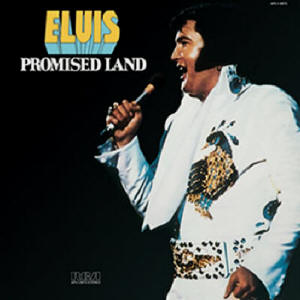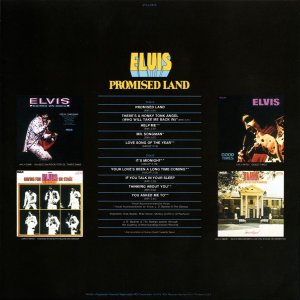Verdict
The album is a fine mix of rock'n'roll, funk, country and pop. Besides that Elvis was in very good voice when he recorded the songs in December 1973.
![]()
(C) Follow That Dream Records
The ultimate site about the king of the analogue age


In January 1975 RCA released "Promised Land". On February 1st it entered the "Top LPs Chart" for 12 weeks and peaked at number 47. On the "Hot Country LPs Chart" the album stayed for 25 weeks and reached number 1. In its initial sales period "Promised Land" moved 350,000 units, the RIAA honored the US sales with a Gold Award in 2014. Worldwide RCA retailed 1.5 million copies, which equals 225 million paid streams. Compared to Elvis' previous studio albums the sales had risen by 50%, but still the level was low. LPs like "From Elvis In Memphis" (1969) or "Elvis Country - I'm 10,000 Years Old" (1971) had moved twice as much copies and even the budget releases by CAMDEN had sold better.
In 2016 the complete Presley catalogue was restored and remastered by Vic Anesini for a boxed set of 60 compact discs called "The Album Collection". Sony Music Entertainment provides the streaming platforms with the same versions of the individual albums (some of them offering bonus tracks), albeit in 24 bit/90 khz flac. That means, if the platform of your choice supports high resolution audio, you can enjoy the tracks in the same quality Sony used to scan and master them. On Spotify, which has a market share of approximately 30% and is the only platform that publishes streaming figures, "Promised Land" accumulates 46 million streams and is requested 16,000 times per day. So today the situation has changed since albums like "Elvis Country - I'm 10,000 Years Old" just clock in at a third of this figure.
Because "Promised Land" had been a top 20 hit, RCA named the album after the song and even mirrored the design of the record sleeve. The backside of the cover was used to promote the king's previous four albums.
The album has a running time of 28:17 minutes.
Originally a recording session had been planned for December 1974, but Elvis' condition made it impossible for him to work and the sessions were moved to March 1975. So the album was filled with the singles "If You Talk In Your Sleep" / "Help Me" and "It's Midnight" / "Promised Land" as well as the remaining material from December 1973.
The songs were recorded at the Stax Studios in Memphis/Tennessee between December 10th and 16th 1973. The sessions were produced by Felton Jarvis and engineered by Mike Moran and Dick Baxter. Elvis' band consisted of James Burton (guitar), Johnny Christopher (guitar), Charlie Hodge (guitar), Norbert Putnam (bass), Ronnie Tutt (drums), David Briggs (piano and organ) and Per-Erik Hallin (piano, clavinet and Wurlitzer Piano). The backup vocals were provided by J.D. Sumner & The Stamps (J.D. Sumner, Ed Enoch, Bill Baize and Dave Rowland), Voice (Donnie Sumner, Sherrill Nielsen, Tim Baty and Per-Erik Hallin) as well as Mary Holladay, Kathy Westmoreland, Susan Pilkington and Jeannie Green. In total the group recorded 18 masters which were used on the albums "Good Times" (1974) and "Promised Land" (1975).
In 2011 Follow That Dream Records released a collector's version of "Promised Land", that also included several unreleased outtakes. For a review of this special edition tap HERE.
Promised Land
The rock'n'roll song was penned by Chuck Berry, whose recording peaked at number 41 of Billboard's "Hot 100" in 1964. Ten years later Elvis' cover version did better and climbed to number 14. The king recorded "Promised Land" on December 15, 1973 within six takes. The track was enhanced with a harmony vocal by Elvis, an echo effect, an organ (overdubbed on January 2, 1974) and a tambourine (overdubbed on January 15, 1974). In the end the king didn't like the result and had his harmony vocal, the echo and the organ removed. Elvis performed the song faster than Chuck and left out a verse. I like the king's cover version much better. It has more drive, James Burton shines on his electric guitar and Per-Erik Hallin adds a funky clavinet. Elvis obviously has fun, too. To me "Promised Land" is one of the king's best recording of the 1970s.
There's A Honkey Tonk AngelThe singer laments the dying relationship with his lady and points out, that there is someone else who would pay a lot more intention to him. Elvis recorded the song by Troy Seals and Denny Rice on December 15, 1973 and selected the 8th take for release. The production was finalized on January 11, 1974 with the addition of strings. Shortly before the king Doby Gray and Conway Twitty had also recorded "There's A Honkey Tonk Angel", the latter one even scored a number one hit with it on the country charts. When a remix of Elvis' version was released in 1979, it charted at number 6 and sold 250,000 units. Fun fact: Cliff Richard had also recorded and released the song in 1975. When he realized that in the US prostitutes were also called honkey tonk angles, he quickly had the record removed from the market.
Help MeEven though the melody sounds a lot like country, the singer asks God for help. Elvis recorded the song on December 12, 1973 within a single take. The strings were added on January 11, 1974. In May of the same year RCA released "Help Me" on the b-side of "If You Talk In Your Sleep" and even though it wasn't the main song, it peaked at number six of the "Hot Country Singles" chart. Elvis himself also seemed to like "Help Me" a lot, because he kept it in his show from 1974 to 1977. A live version can be found on "Elvis Recorded Live On Stage In Memphis" (1974). The song was written by Larry Gatlin and was recorded by him and Kris Kristofferson in 1972.
Mr. SongmanMusically this song is similar to "Help Me" and the singer is asking for help, too. But here he doesn't call on God, but a jukebox! Time after time he puts in a coin and has the machine play the song, which reminds him of the summer night when he held his loved one in his arms and his life was good. Today he would simply stream the tune, but back in the 70s of the past century the world was different. However, the idea is original and the melody is charming. "Mr. Songman" was written by Donnie Sumner and recorded by Elvis on December 12, 1973 within six takes. The violins were added on January 11, 1974. In April 1975 RCA also released the track on the b-side of "T-R-O-U-B-L-E".
Love Song Of The YearIn the song by Chris Christian the narrator was left and doesn't want to expose himself to this feeling ever again. Elvis performs "Love Song Of The Year" just great and I love the song very much. It was recorded on December 12, 1973 and the king needed eight takes to reach a satisfactory result. Further instruments were added on January 2, 1974. Strings followed nine days later. Finally Felton Jarvis shortened the performance of 40 seconds.
It's MidnightThis ballad was meant to be the a-side of the single mentioned earlier, but the radio stations, fans and press favored "Promised Land". Nevertheless "It's Midnight" made it up to number 9 of the "Hot Country Singles Chart". Elvis recorded the song by Billy Ed Wheeler and Jerry Chesnut on December 10, 1973. He workded hard and needed 19 attempts before the performance sounded the way he wanted. On the same day the king also recorded harmony vocals, strings were added on January 10, 1974. Elvis sings about his loneliness in the night in an absolute believable way and masters the soft parts as well as the operatic ones.
Your Love's Been A Long Time ComingThe walz is a declaration of love from a father to his child, but it can also be regarded a regular love song. It was written by Rory Bourke and recorded by Elvis on December 15, 1973 within 9 takes. On January 11, 1974 violins were added and the performance was shortened of a minute. The song isn't ambitious, but I like it very much.
If You Talk In Your SleepThe most unusual song of this album was written by Red West and Johnny Christopher. The funky sound of the 1970s wasn't Elvis' cup of tea, but here he sounds very modern and seems to enjoy himself. The audience also seemed to like "If You Talk In Your Sleep", because the king scored a top 20 hit with the song. It was recorded on December 11, 1973. Take nine was selected for post-production and was enhanced with harmony voices (January 2, 1974), strings (January 10, 1974) and horns (January 11, 1974). The lyrics are about the fear of getting caught cheating. So the singer warns his affair "if you talk in your sleep, don't mention my name" and "if you walk in your sleep, forget where you came".
Thinking About YouElvis recorded "Thinking About You" on December 12, 1973. On January 11, 1974 take 8 was enhanced with strings and shortened of two minutes. The song was written by Tim Baty and can be described as radio-popmusic with a touch of country. Even though the singer mourns the loss of his loved one, the melancholy is just subliminal. It's a nice song and Elvis performs it well. In early 1975 RCA released "Thinking About You" on the b-side of "My Boy".
You Asked Me ToThe album closes with a country song by Billy Joe Shaver and Waylone Jennings. The last mentioned one also released "You Asked Me To" on a single in October 1973 and scored a top 10 hit with it on the country charts. The song was listed for 15 weeks, so it still was on the hitparade when Elvis recorded it on December 11th. Take 6 was selected for release and enhanced with additional instruments on January 2, 1974. The singer promises to do each and everything for his loved one, if she would just ask him. Even though I wouldn't go that far myself, I like the song very much.
The album is a fine mix of rock'n'roll, funk, country and pop. Besides that Elvis was in very good voice when he recorded the songs in December 1973.
![]()
(C) Follow That Dream Records